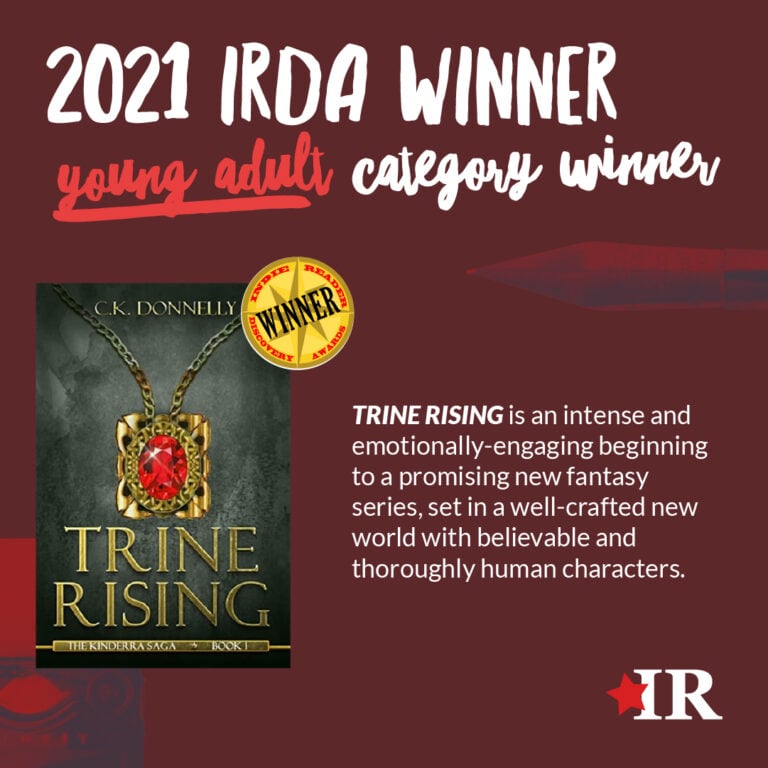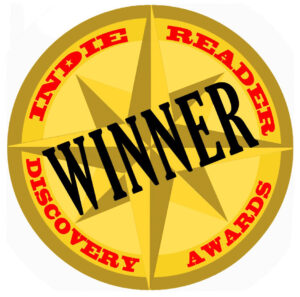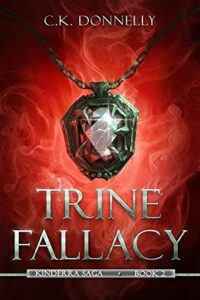Trine Rising, The Kinderra Saga: Book 1 was the winner in the Young Adult category of the 2021 IndieReader Discovery Awards, where undiscovered talent meets people with the power to make a difference.
Following find an interview with author C.K. Donnelly.
What is the name of the book and when was it published?
Trine Rising, The Kinderra Saga: Book 1; Published July 20, 2020.
What’s the book’s first line?
“If I don’t understand my ciphers, I won’t get to be a seer. They’ll never let me choose an amulet,” Taddie whimpered.
What’s the book about? Give us the “pitch”.
Sixteen-summer-old Mirana Pinal is one of the few to have ever possessed all three magical Aspects—Seeing, Healing, and Defending—but she has terrifying visions that wielding her magic will destroy her homeland. As her people fight to stop a cunning warlord from conquering the land and exploiting life to feed his own magic, Mirana must decide if using her powers will save continent — or will they bring her home, her family, and her beloved even more peril.
What inspired you to write the book? A particular person? An event?
I have loved writing my entire life. When I saw Star Wars for the first time as a young child, I was entranced by the scope of the story. I wanted to create something that had just as much breadth and depth, imagination, magic, hope, and realism of “everyday” people in extraordinary circumstances rising to the challenge. That desire to write such a story stayed with me for decades and was finally born as “Trine Rising.”
What’s the most distinctive thing about the main character? Who—real or fictional—would you say the character reminds you of?
I’ve taken the traditional character archetypes and spun them 180 degrees. My main character Mirana Pinal is a prime example—she’s the protagonist but she believes herself to be a potentially destructive force to her homeland. In fact, she knows she may be the “Chosen One,” but could be the evil counterpoint to the heroic and equally gifted Tetric Garis.
I see parallels between Mirana and Aragon, from J.R.R. Tolkien’s “The Lord of the Rings.” Their reticence to take up the hero’s mantle isn’t based on reluctance or lack of self-worth; they both believe that if they do, they could do more harm than good. They both believe running from their destiny might be the more noble choice. (And they also learn such a thing is not possible!)
What’s the main reason someone should really read this book?
In “Trine Rising,’” I’ve balanced many of the trappings epic fantasy fans love—magic, a medieval-type setting, battles between good and evil, prophecies, and a quest of discovery—with characters who struggle with issues we face today—parents fearing for their child, a love interest seemingly out of reach, the sense that a wrongdoing is unforgivable, and more. Because of the modern sensibility of the characters, “Trine Rising” is a fantasy for those who don’t think they like the genre as much as it for readers who love it.
If they made your book into a movie, who would you like to see play the main character(s)?
That is the million-dollar question, isn’t it? Some of the principals would be:
- Mirana Pinal (main character) — Young TV actress Megan Donnelly (no relation, or at least I don’t think so!). She played the daughter on “American Housewife.” Although she’s blonde, that’s not a big deal. She has the youth yet the striving, tentative bravery that epitomizes Mirana at this stage in her life.
- Teague Beltran (Mirana’s boyfriend) — Rowen Kahn would be great for Teague. I saw him on a few Hallmark movies. He would be spot-on. Another possibility is Peyton Meyer, he was also on “American Housewife.”
- Kaarl Pinal (Mirana’s father) — Probably Gerard Butler. He’s quite close physically to what I see in my head as I write.
- Desde Pinal (Mirana’s mother) — I see someone like Connie Nielsen. She played Wonder Woman’s mom.
- Tetric Garis (Mirana’s mentor) — This role is the hardest for me to cast, besides Mirana. I would have loved for Alan Rickman to portray Tetric or even Ian McShane. Today, I’m leaning toward Hugh Jackman. Tetric is nearly 7 feet tall! Kelsey Grammar has the stature and The Voice. I need an ungodly tall, dark-haired, dark-eyed actor with a Shakespearean sensibility about him. Know anyone?
When did you first decide to become an author?
I’ve been writing my whole life, but a serious effort to be a novelist came in the form of a full-length Star Wars fan-fic novel I wrote in 1996. I started on “Trine Rising” in 2000. With the setbacks of real life, unfortunately, it took 20 years (!) to publish it.
I am proud to say “Trine Fallacy, The Kinderra Saga: Book 2” is due out later this summer!
Is this the first you’ve written?
No. I was blessed with a fantastic career as a business journalist and assistant editor for 10 years. “Trine Rising” is, however, my debut novel.
What do you do for work when you’re not writing?
I have a couple of side hustles—I do freelance social media and marketing support as well as stock cards in stores for a greeting card company.
How much time do you generally spend on your writing?
Every day, as much as I have time for!
What’s the best and the hardest part of being an indie?
The best part of being an independently published author is being able to control the entire production chain—from the quality of the story to the art to the marketing. I believe having a supportive and experienced team of professionals (e.g. editors, illustrators, PR) to help is critical to an indie book’s success.
The hardest part of being an indie author is visibility and, frankly, breaking the stigma of poor quality. Millions of novels are produced every year. Climbing to the top of the heap so readers find you is very difficult. The wonderful thing about the ability to publish a book yourself is also the key drawback. Unfortunately, so many indie books are indeed poorly produced. That issue makes it that much harder for those of us authors who have put in the time, effort—and money—to make something on par with traditionally published novels.
Would you go traditional if a publisher came calling? If so, why?
Maybe. There are many advantages to traditional publishing, primarily in exposure. However, I like being able to publish a book when I feel it’s ready and not be rushed to fit a marketing timeline.
Is there something in particular that motivates you (fame? fortune?)
I love a good story. I love writing one, and I love chatting about one just as much. What motivates me is reader engagement. That said, building the Kinderra Saga franchise is very much a business. At some point, I have to make a profit for the series to be sustainable.
Which writer, living or dead, do you most admire?
Oh, Lord, there are too many! Some of my favorites are Jim Butcher, John Steinbeck, James Michener, Anne McCaffrey, Katherine Kurtz, Terry Brooks, and, of course, J.R.R. Tolkien.
Which book do you wish you could have written?
This is a bit of a cheat for an answer, but there really isn’t one. What I do wish is that I could have published “Trine Rising” years earlier—but then it wouldn’t be the same book it is today because I’m not the same person today I was back then!


